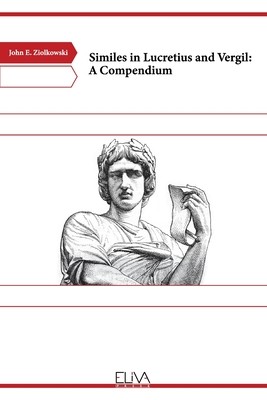
- We will send in 10–14 business days.
- Author: John E Ziolkowski
- Publisher: Eliva Press
- ISBN-10: 9994987623
- ISBN-13: 9789994987627
- Format: 15.2 x 22.9 x 1.5 cm, minkšti viršeliai
- Language: English
- SAVE -10% with code: EXTRA
Reviews
Description
After analyzing the similes in Plato's Dialogues and Homer's poems I have worked on similes in the Bible, Lucretius and Vergil. This study will concentrate on the latter two authors, beginning with a discussion of terms: simile, analogy, and figurative versus literal comparisons. I will follow a definition of simile as "a figurative comparison in which both tenor and vehicle are expressed (with or without a prothesis)" in contrast to a metaphor, which is "an implied comparison in which only the vehicle is stated." This differs slightly from the traditional definition going back to Aristotle (Rhetoric Book 3.4.1-4 [1406b- 1407]), who famously distinguished the two figures by citing an example from the Iliad (e.g., 20.164) where Achilles [tenor] 'rose up like a lion [vehicle]' (hôrto leôn hôs). If Homer had said simply "he rose up, a lion" that would be a metaphor since no word is included to indicate the shift in meaning (metaphora) of the word 'lion' from its literal to a more symbolic sense. The purpose of this study is to provide translations of all the similes in the six books of Lucretius' De Rerum Natura and in Vergil's poems. Three tables and ten appendices reveal various aspects of the poems (like factual comparisons, alliteration and duplicate passages). This has never been done so thoroughly and with such a clear distinction between similes and metaphors.The tables clarify the distribution of the similes in both authors; the conclusion summarizes the numbers, subject matter and the reasons for similes in Latin writers. Thus a thorough examination of this topic will help the reader gain a greater appreciation of the use of simles in Roman authors.
EXTRA 10 % discount with code: EXTRA
The promotion ends in 21d.15:56:10
The discount code is valid when purchasing from 10 €. Discounts do not stack.
- Author: John E Ziolkowski
- Publisher: Eliva Press
- ISBN-10: 9994987623
- ISBN-13: 9789994987627
- Format: 15.2 x 22.9 x 1.5 cm, minkšti viršeliai
- Language: English English
After analyzing the similes in Plato's Dialogues and Homer's poems I have worked on similes in the Bible, Lucretius and Vergil. This study will concentrate on the latter two authors, beginning with a discussion of terms: simile, analogy, and figurative versus literal comparisons. I will follow a definition of simile as "a figurative comparison in which both tenor and vehicle are expressed (with or without a prothesis)" in contrast to a metaphor, which is "an implied comparison in which only the vehicle is stated." This differs slightly from the traditional definition going back to Aristotle (Rhetoric Book 3.4.1-4 [1406b- 1407]), who famously distinguished the two figures by citing an example from the Iliad (e.g., 20.164) where Achilles [tenor] 'rose up like a lion [vehicle]' (hôrto leôn hôs). If Homer had said simply "he rose up, a lion" that would be a metaphor since no word is included to indicate the shift in meaning (metaphora) of the word 'lion' from its literal to a more symbolic sense. The purpose of this study is to provide translations of all the similes in the six books of Lucretius' De Rerum Natura and in Vergil's poems. Three tables and ten appendices reveal various aspects of the poems (like factual comparisons, alliteration and duplicate passages). This has never been done so thoroughly and with such a clear distinction between similes and metaphors.The tables clarify the distribution of the similes in both authors; the conclusion summarizes the numbers, subject matter and the reasons for similes in Latin writers. Thus a thorough examination of this topic will help the reader gain a greater appreciation of the use of simles in Roman authors.


Reviews